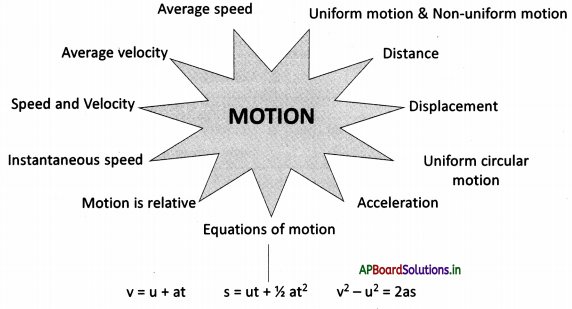Students can go through AP State Board 9th Class Physical Science Notes Chapter 1 Motion to understand and remember the concept easily.
AP State Board Syllabus 9th Class Physical Science Notes Chapter 1 Motion
→ Right and left, day and night, up and down, larger and shorter are relative terms with respect to the position, and point of view of the observer
→ Motion is relative to the observer.
→ A body is said to be In motion when Its position is changing continuously with time relative to the observer.
→ Distance is the length of the path traversed by an object in a given time Interval.
→ Displacement is the shortest distance covered by the object in a specified direction. Its unit in the SI system is ‘meter’.
→ Distance is a scalar quantity, whereas displacement is a vector quantity.
→ Average speed is the distance covered in unit time.
→ Average velocity is the displacement of an object per unit of time.
→ The speed at any instant is called instantaneous speed.
→ Distance -vs- time graph is more useful to study the motion of an object along a straight line, (time on X-axis, distance on Y-axis)
→ The slope of the curve in the D -t graph, at any point gives the speed of the object at that instant.
![]()
→ If a body moves in a curved path, the tangent drawn at a point on the curve gives the direction of velocity at that instant.
→ The motion of the body is said to be uniform when its velocity is constant.
→ D -t graph for a body that is in uniform motion in a straight line.
→ The motion of the body is said to be non-uniform when its velocity changes from time to time.
→ Acceleration is the rate of change of velocity a = \(\frac{\Delta v}{\Delta t}\)
→ The SI unit of acceleration is m/sec2.
→ If the rate of change of velocity is negative, then it is called deceleration (Retardation) denoted by ‘-a’.
→ Equations of uniform accelerated motion are
v = u + at …………………(1)
s = ut + \(\frac{1}{2}\) at2 ……………..(2)
v2 – u2 = 2as ……………..(3)
→ Relative: That exists or that has a particular quality only when compared with something else. Ex: The position of the sun is relative to the earth.
![]()
→ Distance: The length between any two points in a given direction.
→ Displacement: Displacement is the shortest distance covered by the object in a specified direction.
→ Average speed: The distance covered in unit time is called average speed.
Average speed = \(\frac{\text { Total distance }}{\text { Time taken }}\)
→ Average velocity: The displacement of an object per unit time is called average velocity.
Average velocity = \(\frac{\text { Displacement }}{\text { Time taken }}\)
→ Instantaneous speed: Speed at an instant is instantaneous speed which gives the idea of how fast the position of the body changes.
→ Speed: Speed = \(\frac{\text { Distance }}{\text { Time }}\)
→ Velocity: Velocity = \(\frac{\text { Displacement }}{\text { Time }}\)
→ Uniform motion: The motion of the body is said to be uniform when its velocity is constant.
→ Acceleration : Acceleration is the rate of change of velocity.
Acceleration a = \(\frac{\Delta \mathrm{v}}{\Delta \mathrm{t}}\). The SI unit of acceleration is m/sec2.
→ Uniform acceleration: The motion of an object along a straight line with constant acceleration.
(OR)
Equal chances of velocity occur In equal Intervals of time.
![]()
→ Rectilinear motion: The motion of a body along a straight line is called rectilinear motion.
→ Deceleration: It is the decreasing velocity of the object.

→ Aristotle:
- Aristotle was born in 384 BC and died in 322 BC.
- He was a Greek ancient philosopher.
- Aristotle saw ultimate reality in physical objects, knowable through experience.